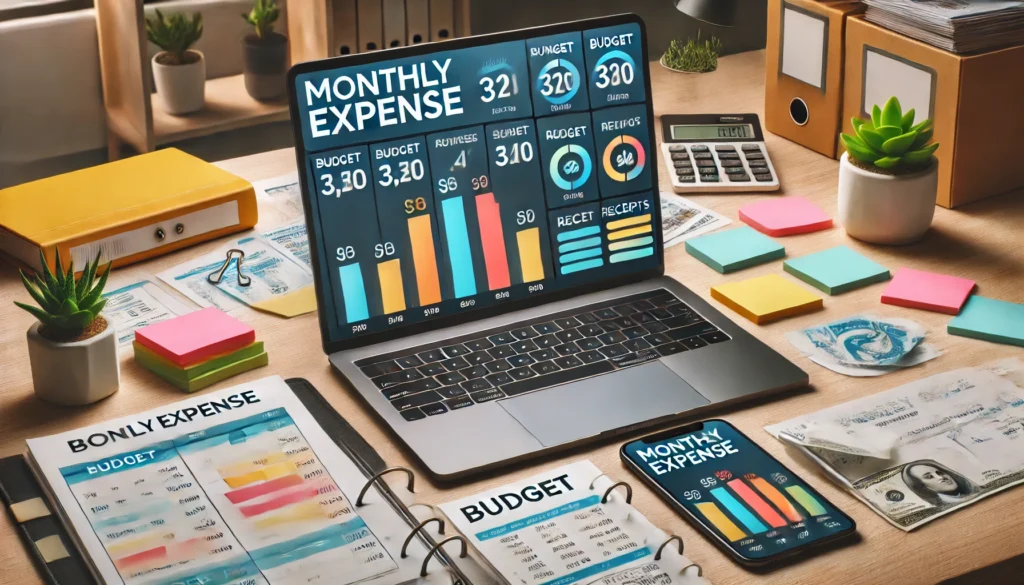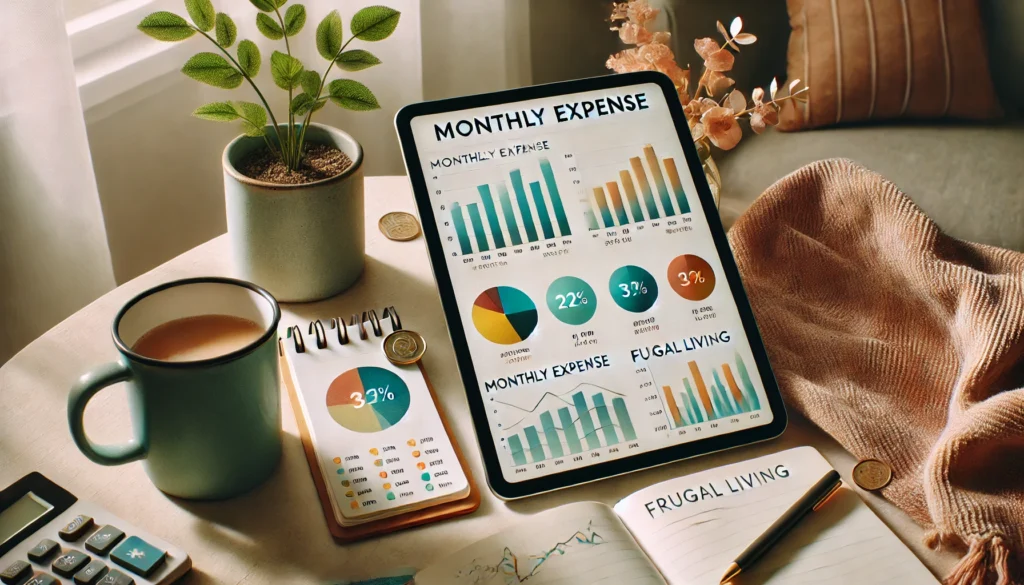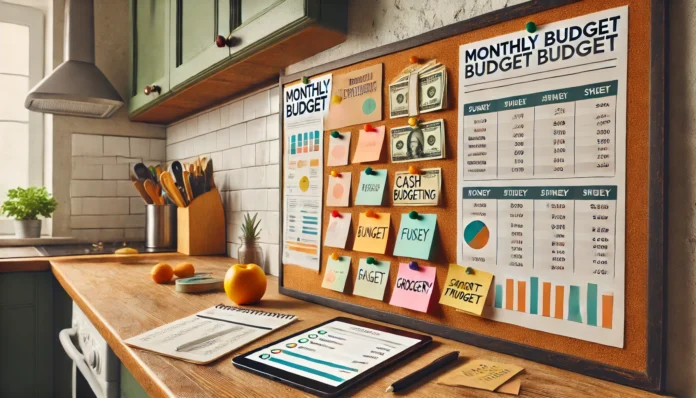Harnessing the Power of a Monthly Expense Report Template for Frugal Living
Frugal living isn’t about deprivation—it’s about making intentional choices that serve your financial goals and personal values. For those who are deeply invested in maximizing savings and minimizing waste, the power of documentation can’t be overstated. This is where a well-structured monthly expense report template becomes more than just a spreadsheet; it transforms into a strategic tool for financial clarity. While many people associate budgeting with broad categories and rough estimations, a monthly expenditure report template forces a deeper level of accountability and specificity. Rather than vague awareness, it delivers laser-sharp insight. And for those committed to a frugal lifestyle, such insight is priceless.
You may also like: 10 Genius Frugal Living Hacks: Effective Ways to Save Money on Household Bills
The magic of a monthly expense report isn’t in the rows and columns, but in the story they tell. Each dollar recorded, every expenditure categorized, is a data point in your financial narrative. By revisiting and analyzing this narrative, you gain more than just knowledge—you gain control. Unlike traditional budgets that often focus solely on projection, a monthly expense report template centers on reality. It reflects what actually happened, not what you hoped would happen. That shift in perspective is essential for sustainable frugal living. If you’re trying to understand where your paycheck disappears or why your savings feel stagnant despite best intentions, the answer almost always lies in the specifics captured in your report.
Furthermore, adopting a system for consistent expense tracking cultivates an invaluable habit: financial mindfulness. This is especially crucial for those living paycheck to paycheck or navigating fluctuating income. Each time you log an expense, you’re reinforcing a commitment to conscious spending. As you build this habit, patterns emerge—and so do opportunities to cut costs and redirect funds toward your highest priorities. When paired with a reliable monthly expense report template, your frugal living strategy becomes less reactive and more proactive, allowing you to anticipate problems before they become crises. In a landscape where many chase elusive savings, a structured expense report grounds you in the reality of your financial behavior, opening the door to smarter, more impactful decisions.

Why Expense Tracking Matters in a Frugal Lifestyle
At the heart of every effective frugal living strategy is awareness—not just of what you earn, but of where every dollar goes. Expense tracking is the mechanism by which that awareness is achieved and maintained. Without it, even the most well-intentioned budget can devolve into guesswork. Many people overestimate their ability to mentally track their spending, leading to underreported purchases, overlooked subscriptions, or lifestyle inflation that creeps in gradually. A monthly expenditure report template counteracts these blind spots by offering an organized and consistent way to document every outflow of cash.
Unlike generalized budget categories that often lump spending into broad terms like “entertainment” or “groceries,” an expense report reveals the nuance. It distinguishes between a $15 streaming service and a $120 dining-out tab, helping you understand not only what you’re spending but how and why. This level of detail is critical when trying to identify spending leaks or justify lifestyle choices. It allows you to reflect on whether your money is aligning with your values. In the context of frugal living, where every dollar has a job, this reflection is the difference between progress and stagnation.
Moreover, expense tracking isn’t just about cutting costs—it’s about optimizing them. Many assume that frugality is synonymous with sacrifice, but in truth, it is a form of efficiency. By using a monthly expense report template, you can evaluate whether you’re getting sufficient value from each purchase. That $100 gym membership might make sense if you’re using it consistently and reaping the benefits, but if it’s gathering digital dust, it’s an obvious cut. This process turns expense reports into tools for value assessment, not just penny counting.
Additionally, tracking expenses builds an archive of financial behavior that can inform future decisions. Over time, you begin to spot seasonal trends, recurring one-time purchases, or unnecessary redundancies. With enough historical data, your financial planning becomes rooted in evidence rather than emotion. This analytical approach strengthens your frugal living strategy, equipping you with the tools to spend less not by force, but by design.
Choosing the Right Monthly Expense Report Template
Not all templates are created equal. The format, usability, and accessibility of your monthly expense report template can significantly influence your commitment to using it consistently. For those just beginning their frugal living journey, simplicity is key. A free expense report template in Word format can be a powerful starting point. Its familiar interface lowers the barrier to entry and requires no special software skills, making it accessible even to those new to personal finance.
However, as your financial literacy grows, you may find that more dynamic solutions better meet your needs. Spreadsheets with built-in formulas, automated categorization, and visual analytics can offer additional layers of insight. These features reduce manual input while enhancing clarity. A well-designed monthly expenditure report template should balance detail with digestibility. If it becomes too cumbersome to maintain, you’re unlikely to stick with it—and consistency is non-negotiable if you’re serious about sustainable savings.
The design of the template should also reflect your lifestyle. A freelancer with fluctuating income, for example, may require a more flexible format than a salaried employee with predictable cash flow. Families might need a shared system that accounts for multiple spenders, while individuals may prefer something more private and personalized. Some may benefit from incorporating an online expense report platform, which allows for real-time data entry and cloud storage. This can be particularly helpful for tracking expenses on the go and collaborating with partners or financial advisors.
Ultimately, the best monthly expense report template is the one that integrates seamlessly into your life. Whether that means a printable form taped to the fridge or a sophisticated online dashboard is up to you. The goal is not to impress with complexity, but to inform with clarity. Once you find a format that encourages regular use and deep reflection, you’ll begin to notice the powerful intersection between documentation and discipline—a hallmark of every successful frugal living strategy.
Transitioning from Budgeting to Reporting: A Necessary Shift
Budgeting and expense reporting are often conflated, yet they serve distinct purposes. Budgeting is proactive, offering a plan for your money before it’s spent. Expense reporting, on the other hand, is retrospective. It shows what actually happened. While both are important, the frugal lifestyle thrives at the intersection of these two approaches. Transitioning from a budgeting-only mindset to one that incorporates monthly expense reporting can transform your financial strategy from speculative to data-driven.
This shift requires you to move beyond assumptions and aspirations. Instead of projecting that groceries will cost $300 this month, your monthly expense report template will reveal whether that target is realistic. Over time, these reports expose habitual overspending or underestimations that distort your financial picture. Armed with this information, you can adjust your budget with greater accuracy, reducing stress and increasing your likelihood of staying on track.
Expense reporting also introduces a level of accountability that budgeting alone often lacks. It’s easy to rationalize a splurge when there’s no system in place to evaluate its impact. But when every transaction is logged, there’s a psychological incentive to think twice. The act of documenting forces a pause, a moment of reflection that can prevent impulse spending. In this way, expense reports become more than financial tools—they become behavioral checkpoints.
Moreover, a consistent monthly expenditure report template builds historical context. You begin to understand not just what you spent, but why. Maybe your dining expenses spike during stressful work periods, or your utility bills climb each winter. This context empowers you to take action. Whether it’s meal prepping during busy weeks or upgrading to energy-efficient appliances, your report becomes a springboard for frugal innovation.
Ultimately, incorporating expense reporting into your routine doesn’t replace budgeting—it enriches it. The two processes inform and refine each other. When used together, they create a feedback loop of awareness and action. This synergy is what turns financial management from a chore into a craft. For those dedicated to frugal living, that craft is the foundation of long-term wealth and peace of mind.

Frequently Asked Questions (FAQ) on Expense Reporting
1. Why is a structured expense report essential for financial tracking?
A well-structured expense report provides clarity and organization, ensuring every financial transaction is accounted for. Businesses and individuals alike benefit from a systematic approach to tracking expenses, as it helps identify spending patterns, detect inefficiencies, and optimize budget allocation. Using a free expense report template Word format simplifies documentation while maintaining a professional appearance. For companies managing multiple employees, standardizing reports through a monthly expense report template prevents discrepancies and promotes transparency. Additionally, an online expense report system allows real-time tracking, reducing the risk of errors and unauthorized expenditures.
2. How does a digital expense reporting system improve efficiency?
Transitioning from manual to digital expense reporting streamlines approval processes and enhances accuracy. With an online expense report, businesses can automate calculations, set approval workflows, and integrate with accounting software. This significantly reduces administrative overhead and ensures compliance with internal policies. Unlike traditional paper-based methods, a monthly expenditure report template in digital form allows for easy access, filtering, and cross-referencing with past reports. Furthermore, automation minimizes human error, ensuring that reimbursement claims and financial statements remain precise and timely.
3. What are the common mistakes to avoid when preparing an expense report?
One of the most frequent errors is failing to categorize expenses correctly, which can lead to misinterpretation of financial data. Using a free expense report template Word helps by providing predefined categories and structured entry fields. Another mistake is neglecting to attach receipts or documentation, which is crucial for audit purposes. Duplicate entries also pose a significant risk, causing inflated costs or reimbursement delays. To prevent these pitfalls, a monthly expense report template with built-in validation checks can be beneficial. Lastly, submitting reports late can disrupt financial planning, so integrating an online expense report system with reminder notifications ensures timely submissions.
4. How can businesses enforce compliance in expense reporting?
Companies should implement clear expense policies and require all employees to use a standardized monthly expenditure report template. Automating policy enforcement through an online expense report platform helps flag non-compliant transactions instantly. Regular audits ensure that employees adhere to company guidelines while deterring fraudulent claims. Training employees on best practices and emphasizing the importance of accurate reporting can further enhance compliance. Additionally, utilizing a free expense report template Word with built-in policy reminders can guide employees in submitting accurate and policy-compliant reports.
5. What are the benefits of using a template for expense reporting?
Using a free expense report template Word eliminates formatting inconsistencies and saves time. A structured monthly expense report template ensures all necessary fields are included, reducing the risk of omitted information. Templates also standardize financial data, making it easier for accountants and auditors to review reports efficiently. If integrated into an online expense report system, templates can auto-fill repetitive fields, reducing manual data entry. Finally, templates enhance organization, allowing users to categorize expenses accurately, track trends, and improve financial forecasting.
6. How can small businesses optimize their expense reporting process?
Small businesses often operate with limited resources, making efficient expense tracking crucial for financial stability. Implementing a monthly expenditure report template simplifies record-keeping and reduces administrative burdens. Cloud-based solutions allow easy access to an online expense report system from any location, enabling remote teams to submit reports in real-time. Categorizing expenses effectively ensures proper tax deductions and better cash flow management. Moreover, adopting a free expense report template Word with automated calculations eliminates errors and streamlines reimbursement processes.
7. What features should an ideal expense reporting system include?
An effective online expense report system should offer user-friendly interfaces, automated approvals, and integration with accounting software. Customization options within a monthly expense report template allow businesses to adapt the format to their specific needs. Receipt scanning and digital attachments enhance accuracy and facilitate audits. Multi-user accessibility enables teams to collaborate and update reports seamlessly. Additionally, real-time analytics provide valuable insights into spending trends, aiding in informed decision-making and budget adjustments.
8. How does real-time expense tracking impact financial decision-making?
Real-time tracking using an online expense report system provides businesses with up-to-date financial insights. This allows managers to identify budget overruns early and take corrective action before financial strain occurs. A monthly expenditure report template enables trend analysis, helping businesses forecast future expenses accurately. Moreover, instant expense tracking minimizes discrepancies, preventing fraudulent claims and unauthorized spending. By integrating real-time updates with a free expense report template Word, businesses ensure that financial data remains current and actionable.
9. What role does expense reporting play in tax preparation?
Accurate expense reporting is crucial for tax compliance and deduction claims. A monthly expense report template helps categorize deductible expenses, ensuring businesses maximize tax benefits while staying within legal boundaries. Digital tools, such as an online expense report, simplify documentation by storing all records in an organized, searchable format. Properly maintained reports reduce audit risks and streamline the filing process. Additionally, using a free expense report template Word ensures consistency in reporting, making it easier to provide necessary documentation during tax audits.
10. How can businesses integrate expense reports with financial forecasting?
Expense reports serve as a foundational element in financial planning. A monthly expenditure report template provides historical data that helps businesses predict future spending and allocate budgets effectively. By analyzing trends from an online expense report system, businesses can identify cost-saving opportunities and areas for financial optimization. Predictive analytics, combined with structured expense tracking, enhance long-term strategic planning. Lastly, using a free expense report template Word in conjunction with data visualization tools allows companies to present financial insights clearly, aiding in executive decision-making.

Conclusion: Maximizing Savings Through Intentional Tracking: The Lasting Impact of a Monthly Expense Report Template
Embracing a monthly expense report template as part of your financial routine isn’t just a smart strategy—it’s a transformative habit that can redefine how you live, spend, and save. In the context of frugal living, where every dollar has purpose and every expense deserves scrutiny, the power of structured expense tracking cannot be overstated. It creates visibility where there was once vagueness, discipline where there was once drift. Whether you’re using a free expense report template in Word or an advanced online expense report tool, the core value lies in the insight and awareness it brings to your financial behavior.
A well-maintained monthly expenditure report template doesn’t just reflect numbers—it reveals patterns, priorities, and potential. It tells you not just where your money went, but whether it went in alignment with your values and goals. This ability to analyze and adjust, based on concrete evidence rather than guesswork, is what elevates your budgeting from reactive to strategic. With this approach, frugal living becomes less about saying no and more about saying yes to what truly matters.
Over time, the simple act of recording each transaction can compound into massive financial gains. It enables you to identify waste, plug financial leaks, and confidently redirect funds toward savings, investments, or meaningful experiences. The clarity and control gained through consistent use of a monthly expense report template are the foundation for sustainable frugal habits that can lead to lasting wealth and peace of mind.
Whether you’re just starting your frugal journey or refining a seasoned strategy, integrating a monthly expense tracking system is one of the most effective ways to supercharge your efforts. It’s not just about saving more each month—it’s about living with purpose, spending with intention, and building a future grounded in financial freedom.
monthly expense tracking tips, frugal budgeting strategies, personal finance tools, expense management for families, simple savings methods, budget planning for beginners, digital budget planner, frugal household systems, tracking daily spending, saving money each month, household money management, income and expense analysis, personal expense audit, family budgeting insights, financial organization techniques, mindful spending habits, cutting monthly costs, practical frugal living, effective savings plans, real-world budgeting advice
Further Reading:
How to make a monthly budget in 5 simple steps
Frugal Living in Urban India: Saving Money Without Sacrificing Quality of Life
How an expense report template can improve cost control (with examples)
Legal Disclaimer
The information provided in this article is for general informational purposes only and is not intended to constitute financial, investment, legal, tax, or other professional advice. The content should not be relied upon for making any financial or investment decisions. Readers are encouraged to consult with licensed professionals, such as financial advisors, attorneys, or tax experts, to obtain personalized advice tailored to their individual circumstances. The author and publisher disclaim any liability for any actions taken or not taken based on the information provided in this article.





